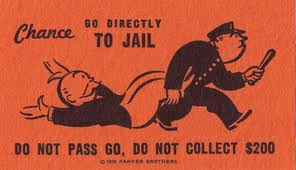 Do Not Pass Go: Prison and It’s Impact on the Black Community
Do Not Pass Go: Prison and It’s Impact on the Black Community
Do Not Pass Go is the second topic in the discussion on Justice or Just Us. The focus of this discussion is centered on the impact that prison has had on the Black Community and whether we can do anything to hinder it.
The 3 Questions
1. Does the Black Community benefit more than it suffers from the use of prisons in America as currently constituted, why or why not?
2. What do you feel is the biggest reason for such a disproportionate number of Blacks in Prison?
3. Is prison the new form of slavery?
FRONT STREET
Monopoly is my favorite board game ever because of the competitiveness and tactics necessary to survive and thrive in it. The game teaches you how to invest, how to take a financial lose, and that sometimes the wrong roll of the dice can land you in prison. All games aside, going directly to jail has been a reality in the Black and impoverished communities for decades. There are a myriad of theories and thoughts about why the pipeline from Our neighborhoods to prison exist, but the problem isn’t the how it’s the why! Why does it seem like 25% of Our male population is destined for trouble with the law? That means if you have 4 sons and you are Black, one of them is going to go to prison!! Are We really that bad? Are the rules really that strict? Are We ever given the benefit of doubt? Is the idea of the laws heavy handedness with Us to blame for the destruction of Black community?
Please write in and response to our 3 poll questions or post some questions that you would like to see asked. These question and more were addressed on March 18, 2017 during the discussion which is now airing on YouTube.





1. I think that the black community suffers more from the use of prisons because we have plenty of people getting arrested and taken out of the community, yet the crime rate never really declines or the community never gets safer.
2. Black people being presumed guilty instead of innocent is the biggest reason for the disproportionate number of us in prison. I by no means think that all black people are innocent of all the crimes that they are picked up for but this attitude of guilty until proven innocent by the powers that be is the reason they over police our community, which leads to more interaction and incarceration, which leads to the dicey convictions and harassment of black people.
3. I find it odd that we are the usual suspects when it comes to crime and that many of the policies seem to be a direct reaction to our emancipation. However, I don’t think that the prisons produce enough material to be considered slavery of the early USA even with the fact that some affluent person is making a killing off of the land, labor, and locations of these prisons.
1. I agree that the current set up of the justice system and use of prisons in America is not beneficial to the Black Community. Any criminal record, even for low-level misdemeanors, and especially past the age of 18, places major roadblocks on things like employment and housing options, which further affects an individual’s self-esteem and sense of self-worth and that of their families, their ability to provide for self and family, and a stigma amongst peers and neighbors. Prison can impose disenfranchisement that lasts far beyond the sentence itself. When the lasting effects of convictions and prison time on a person is applied to whole neighborhoods, it can have disenfranchising effects on entire communities.
2. Research has shown that individuals who live in neighborhoods with high minority populations are detained more often, regardless of their individual race or the crime level of the neighborhood. [1] Implicit bias, both in the media and among the general public, plays a strong factor in higher levels of policing and detention, harshness of sentencing in the courtroom, and passage of mandatory minimum sentencing laws. Income inequality probably also plays a role – an article by Christopher Poulos shows the tendency of public defenders (versus expensive private defense attorneys) to assume guilt and urge defendants to throw themselves at the mercy of the court. [2]
One could also get into explanations of persisting poverty in some minority communities having roots in historic laws designed to bar minorities from access to housing, public education, universities, and employment, which contributes to higher levels of poverty and unemployment or underemployment, which in turn can contribute to higher crime rates and higher policing and incarceration rates.
3. I guess it would depend on how you think of or define slavery. No, the current justice system with high levels of racial disparity and bloated prison populations isn’t part of a system of economic output, and is really more of a drain on local, state, and federal economies than much else of social value. But in the sense of subjugation and preventing enfranchisement and economic mobility of minority populations in general, I think you could argue that it qualifies.
References:
1. “The Color of Justice: Racial and Ethnic Disparity in State Prisons”, Nellis, Ashley, The Sentencing Project, Copyright © 2016
2. Featured Story, Poulos, Christopher, The Sentencing Project, May 2017, http://www.sentencingproject.org/stories/christopher-poulos/